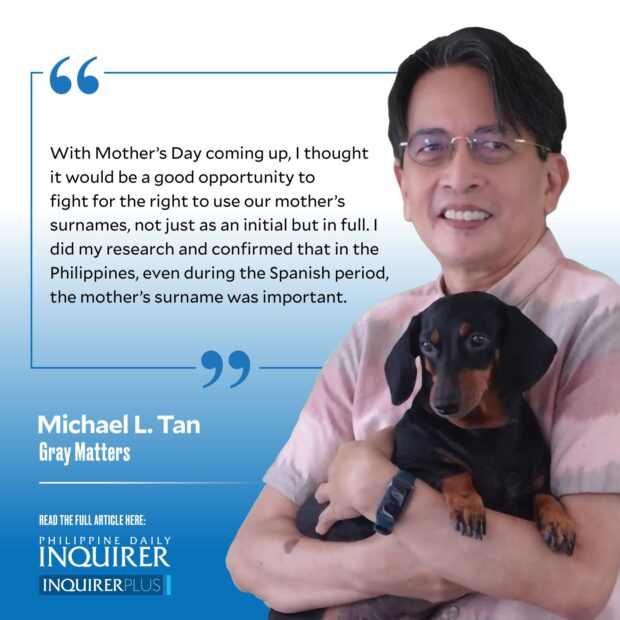
I grew up Michael Tan, pure and simple.
As I grew older I realized names were more complex. Names are us; names differentiate us, but it wasn’t that simple in Xavier, the school I studied in for grade and high school, where at least three of us were named “Michael Tan.” I still keep running into new doppelgangers, including “Mike Tan”—when people ask about the actor I answer deadpan, “My son, so much better looking, no?”
Then my Chinese name came into the picture. In my turbulent teenage years, they consulted a Chinese fortune-teller who told my parents they had to change my Chinese name, which was messing up my life because it had too many strokes. The new name didn’t really help to simplify my life but I still use it because, conveniently, the original name was written in traditional script, still used in Taiwan while the newer one was in the simplified script adopted in the People’s Republic of China.
Still, another complication cropped up. The common-ness of “Michael Tan” became a liability when I had to travel overseas. Because there were so many of us, it was inevitable that it would include some unsavory ones wanted for various brushes with the law.
Whenever I travel overseas, I still carry a “Not the same person certification” issued by the Department of Justice, stating that I am not the Michael Tan(s) listed in blacklists, some going back to the 1990s.
The certification is clear about who I am, including my full name: Tan, Michael Lim.
That full name took more significance as I became more involved with feminist issues, which I’ve always defined, simply, as “respecting and honoring women.” In this case of using maternal surnames, this meant my mother. As I still explain to people, including my editor Juliet Javellana, who has approved a change in my “Gray Matters” byline to my full name, I am more of my mother’s son. No dishonor intended for my father but let’s face it, because mothers are often more involved than fathers in parenting, they end up with a greater influence on our personhood.
It wasn’t too difficult getting people to use my full name. When I became University of the Philippines Diliman chancellor, “Michael Lim Tan” was standard in documents, announcements, invitations.
Unexpectedly, as chancellor, I found a new challenge when I had to deal with Chinese partner universities. Many were thrilled that the chancellor was a person of Chinese descent and would ask if I had a Chinese name. To their delight, I’d write out my name in Chinese.
But now I was bothered because my mother’s surname, which reads “Lin” in Mandarin Chinese, wasn’t in the Chinese name. A few years ago, I learned that the mainland Chinese were beginning to use shuang xing or paired surnames, including both paternal and maternal surnames, reflecting increasing gender egalitarianism in China. I began to use both Chen (Mandarin for Tan) and Lin in my Chinese name, which appears in my email footers.
That caught on. Imagine my joy attending a recent academic conference in Taiwan where my nameplate used both Michael Lim Tan and my Chinese name with the “Lin.”
To my disappointment, and deeply hurt feelings, on the last day of the conference, I noticed I had a new nameplate with my mother’s surname deleted. The one who requested it was even proud to tell me she had “corrected” the mistake. I explained I used both surnames to honor my mother but no, she said it just wasn’t done by the Chinese.
With Mother’s Day coming up, I thought it would be a good opportunity to fight for the right to use our mother’s surnames, not just as an initial but in full. I did my research and confirmed that in the Philippines, even during the Spanish period, the mother’s surname was important. I would be “Michael Tan y Lim.” The American colonial period changed the sequence to a given name, a middle name (the maternal surname), and a last name (paternal surname), still used today.
I also did my research on China and found “Chinese Regulations of Name Registration” issued in 2011. Article 8 could not be clearer: “The use of the last names of both parents is permitted.”
There’s so much more that can be written about the history and politics of surnames, including women keeping their surnames after marriage, but let’s save all that for future columns. For now, let me cap my defense of maternal surnames by pointing out that both my mother and my paternal grandmother, who also played an important role in shaping my character, were surnamed Lim/Lin.
mtan@inquirer.com.ph